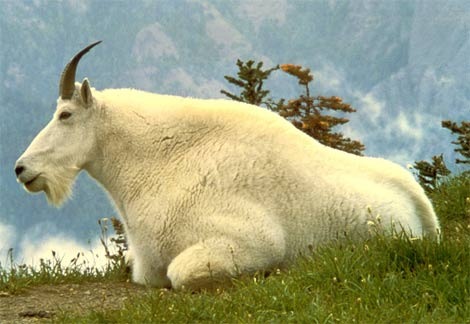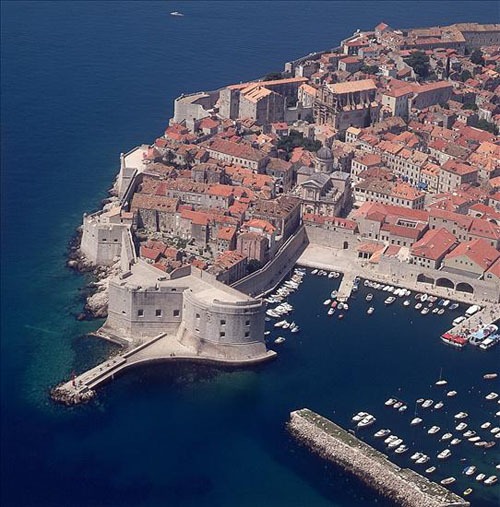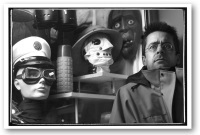
If you've read Jude: Level 1, you'll know I'm highly entertained by the glorious free-market energy of the US prison system. (The total number of people in prison, on parole, and on probation, in the US at the end of 2007 was 7.2 million - damn near twice the population of Ireland - so that's a lot of entertainment.)
But a magnificent new twist has emerged, which even I hadn't thought of. Over in Pennsylvania, people eventually started to wonder why the local judge was sentencing teenagers to serious time for crimes like putting up a spoof Myspace page about their assistant headmaster (a page marked "this is a joke"). As the New York Times reports..
"The answers became a bit clearer on Thursday as the judge, Mark A. Ciavarella Jr., and a colleague, Michael T. Conahan, appeared in federal court in Scranton, Pa., to plead guilty to wire fraud and income tax fraud for taking more than $2.6 million in kickbacks to send teenagers to two privately run youth detention centers run by PA Child Care and a sister company, Western PA Child Care.
While prosecutors say that Judge Conahan, 56, secured contracts for the two centers to house juvenile offenders, Judge Ciavarella, 58, was the one who carried out the sentencing to keep the centers filled."
Brilliant... Sigh. I am simply too innocent to be a real satirist. It never occurred to me to formally employ the judges.... Anyway - and skip this if you've read it before - while I'm at it I thought I might as well paste in a big chunk of Jude: Level 1 at this point, for the amusement of new readers. (I'm hardly going to sue myself for copyright infringement.)
In this bit, Jude has lost his voice, got a crick in his neck, is stuck in a wheelchair, and has been mistaken for Professor Steven Hawking. Barney O'Reilly FitzPatrick McGee, the Irish-American CEO of the great American communications company, Westcom, is showing him around a huge, secret, underground unit in their Galway plant...
From Jude: Level 1...
“You’ve noticed they’re mostly Black, huh?” said Barney.
I looked closer, and saw that most of the faces around me were indeed unusually deeply tanned for an underground Irish workforce in mid-winter.
Barney nodded. “Might be the last generation of authentic, home-grown Blacks to work for Westcom, and I’ll tell you why…” He looked about the great space, and a drop of moisture swelled in the corner of each eye.
I settled back in my chair. I liked a story.
He blew his nose, and cleared his throat. “Back when old man Fitzpatrick grew tobacco, the procuring of labour was an arduous, expensive, time-consuming business. Black men had to be sourced and purchased from unscrupulous Arab middlemen and imported by ship from West Africa. Spoilage rates were as high as 50%. Oh, times were tough for old man Fitzpatrick. Sure, eventually we had sufficient spare capacity to provide a breeding stock, and we were self-sufficient in labour. But then the cost of raising our African workers fell entirely on our family, a manifestly unfair situation. Often we’d get a good crop of sturdy young Blacks raised up to five or six years of age, near enough ready to do productive work and repay our investment: and they would all sicken and die in the sheds, and we had all the weary work to do all over again. The situation was intolerable, it was against natural justice: and so we campaigned for the abolition of slavery.”
I nodded my approval of this virtuous campaign.
“Came the glorious day, and we could kick them all out and they could rear their own brats on their own time, and their own dime. We rehired them, as needed, when they had matured. This improved profitability enormously. Productivity shot up too, for now the workers no longer had a cushy berth for life. The excess money saved, we invested in mining and smelting the iron ore in the hills too steep for cultivation. But, for that, a steady supply of strong male labour was required. We couldn’t be willy-nilly hiring by ones and twos. And so we contracted with the local prisons to supply our needs. They sourced the male labour as required. A vagrancy sweep, or a crackdown on gambling would supply peak labour demand at the mine. By now we were Western American Steel... But pretty soon we were paying so much out to the prisons for convict labour that we had a change of heart. Old grandpappy Fitzpatrick built our first prison. And so we could get the State, then later as we expanded into Federal Prisons, the Federal Government to pay to feed and house our workers, and we could pay ourselves for their services. So we were getting paid for them to work for us. It was soon our most profitable unit… You may have heard of our correctional subsidiary, American Stars ‘n’ Bars? Our Patriot Prison? With its uniquely flexible modular system?"
“Hmm?” I had been watching the green-eyed woman, who was very carefully taking something out of a safe and transferring it to a silver container that bounced light across her cheekbones, her noble nose… I shook my head, though as my head was on its side this involved rotating my face vertically rather than horizontally relative to the surface of the earth. Barney tilted his head in sympathy with mine.
"That's a... yes. Ha ha. Are you nodding or, ha ha... Anyway, as WAS became Westcom, and our jobs moved up the value chain, our prisoners, chiefly Negroes of little educational attainment, simply weren’t cutting it. Oh, they were bright and willing, but training them up costs time and money, and these guys simply weren’t inside long enough to make the investment worthwhile. They were missing out on training opportunities, the chance of betterment… Why, it was a crime. It was worse than a crime: it was a tragedy. So we lobbied Congress long and hard to give us time to really make a difference to these young men’s lives. And so we got their sentences doubled.”
I nodded, sideways, and stared at the face of the dark haired, green eyed woman. Head bowed over the silver container, staring into its depths.
“…But as Westcom became a favoured contractor on Federal Government Defence contracts, and we came to understand the Federal Government better, we came to… if I may use the word… love the Federal Government. And we began to feel concern for its welfare. You’ve got to see the bigger picture, and take the longer view. As the Federal Government pays us up to $500 for a screwdriver on our Defence contracts, it makes sense to maximise the State’s revenues so that they can pay us… Thus, if we can lower the burden on the Government, we can increase our income and profitability. And our prisoners are fine, fine, people. But they cost the Government a fortune in benefits, in healthcare and education, in providing streetlighting to their ghettos and so forth, before they are old enough to graduate to prison. It is the old problem my ancestor faced, of covering the overhead on their unproductive years. So the future lies in outsourcing labour to foreign slave-states. Let the Chinese and Hindus and so forth raise the whining infants to maturity. Not on America’s tab… We will build our prisons abroad, and ship the goods home. Indeed, we have used this opportunity to rethink the entire prison paradigm. In our next-generation foreign prisons, the prisoners will be kicked out after their shift and will have to feed and house themselves at their own expense. It is quite, quite brilliant, and will enhance profitability threefold… And so these are the last, I fear, of the great Black American workforce which my family has served so proudly and so humbly for so long. Here, meet some, before they vanish, like the Buffalo…”
He waved, and two young men in dark suits walked over to us. Barney whispered in my upturned ear, “Lately many of them have discovered Religion. I have encouraged it, for it makes them more Punctual, but Christ Almighty, they tend to go on about it… Gentlemen! I’d like you to meet Professor Stephen Hawking.”
“Sir.”
“Sir.”
I asked them about their religion. Barney groaned.
“Well sir, we are brothers in the Brotherhood of Brothers of Muhammad in the Hood.”
“Followers of the teachings of Muhammad…”
“It is a little known fact that Muhammad was a Black man, of Africa…”
“It is a little known fact that the first man to whom the Prophet gave the honour of giving the Call to Prayer was a freed Black slave, Bilal…”
“And so we follow that great Religion…”
“A Religion blind to the colour of a man’s skin.”
”A Religion of compassion.”
“Religion of Love.”
“Religion of tolerance.”
"... for the Prophet taught us to hate no-one.”
"And thus we hate no one."
"Except the fucking Mexicans."
"Yeah the Mexicans. And the fucking Koreans."
"…’king Koreans. And whitey."
"Yeah, whitey."
"Fuck the Man."
"And the cops."
"Fuck the cops."
"Nothing worse than a black man in a cop jacket."
"Fuck those negroes."
"Yes, fuck them."
“Thank you, gentlemen,” said Barney.
“Sir.”
“Sir.”
They bowed and left.
“Oh well, it is better than Marxism,” said Barney.
(From Jude: Level 1, published in the UK by Old Street Publishing. And published in Greek by Topos Books, very handy if you're Greek...)
(Oh, and the terrific image is borrowed from Prison Penpals, check 'em out.)










